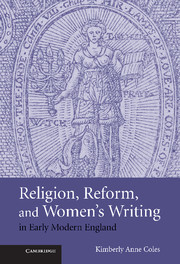Book contents
- Frontmatter
- Contents
- Acknowledgments
- Abbreviations
- Introduction: Making sects: women as reformers, writers, and subjects in Reformation England
- 1 The death of the author (and the appropriation of her text): the case of Anne Askew's Examinations
- 2 Representing the faith of a nation: transitional spirituality in the works of Katherine Parr
- 3 ‘[A] pen to paynt’: Mary Sidney Herbert and the problems of a Protestant poetics
- 4 A new jerusalem: Anne Lok's ‘Meditation’ and the lyric voice
- 5 ‘A Womans writing of diuinest things’: Aemilia Lanyer's passion for a professional poetic vocation
- Afterword
- Notes
- Index
2 - Representing the faith of a nation: transitional spirituality in the works of Katherine Parr
Published online by Cambridge University Press: 06 July 2010
- Frontmatter
- Contents
- Acknowledgments
- Abbreviations
- Introduction: Making sects: women as reformers, writers, and subjects in Reformation England
- 1 The death of the author (and the appropriation of her text): the case of Anne Askew's Examinations
- 2 Representing the faith of a nation: transitional spirituality in the works of Katherine Parr
- 3 ‘[A] pen to paynt’: Mary Sidney Herbert and the problems of a Protestant poetics
- 4 A new jerusalem: Anne Lok's ‘Meditation’ and the lyric voice
- 5 ‘A Womans writing of diuinest things’: Aemilia Lanyer's passion for a professional poetic vocation
- Afterword
- Notes
- Index
Summary
What matters, finally, in understanding emergent culture, as distinct from both the dominant and the residual, is that it is never only a matter of immediate practice; indeed it depends crucially on finding new forms or adaptations of form. Again and again what we have to observe is in effect a pre-emergence, active and pressing but not yet fully articulated, rather than the evident emergence which could be more confidently named.
Raymond Williams, Marxism and literatureYou say that it's gospel, but I know that it's only church.
Tom WaitsAt a moment when the English people were revaluating the merits of internal and external authority, the seemingly private religious expression of women could speak to newly urgent public concerns. But the way that private expression resonates as public experience is markedly different when the woman writer is herself a public figure. The transitional spirituality in the work of Queen Katherine Parr reflects an England moving tentatively between the old faith and new. Parr herself also functions within her texts as a figure of transition. In The lamentacion of a synner, she models her work according to Lutheran prescriptions outlined in the Preface to the Epistle to the Romans. In so doing, she follows the pattern of Pauline devotion (outlined by Luther) in an attempt to revaluate her ‘wreched former lyfe’ as a Catholic.
- Type
- Chapter
- Information
- Publisher: Cambridge University PressPrint publication year: 2008



